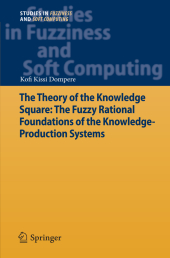 Neuerscheinungen 2014Stand: 2020-02-01 |
Schnellsuche
ISBN/Stichwort/Autor
|
Herderstraße 10
10625 Berlin
Tel.: 030 315 714 16
Fax 030 315 714 14
info@buchspektrum.de |

Kofi Kissi Dompere
The Theory of the Knowledge Square: The Fuzzy Rational Foundations of the Knowledge-Production Systems
2013. 2014. xxxii, 212 S. 235 mm
Verlag/Jahr: SPRINGER, BERLIN; SPRINGER 2014
ISBN: 3-642-44577-2 (3642445772)
Neue ISBN: 978-3-642-44577-4 (9783642445774)
Preis und Lieferzeit: Bitte klicken
This book offers a meta-theory of knowledge-production process and the logical pathway that connects epistemic possibility to epistemic reality. Covers paradigms for information processing and isolates classical and fuzzy paradigms for comparative analysis.
The monograph is about a meta-theory of knowledge-production process and the logical pathway that connects the epistemic possibility to the epistemic reality. It examines the general conditions of paradigms for information processing and isolates the classical and fuzzy paradigms for comparative analysis. The sets of conditions that give rise to them are defined, stated and analyzed to abstract the corresponding sets of laws of thought. The fuzzy paradigm with its corresponding logic and mathematics is related to inexact symbolism for the defective information structure where the results of the knowledge production must satisfy the epistemic conditionality, composed of fuzzy conditionality and fuzzy-stochastic conditionality under the principle of logical duality with continuum. The classical paradigm with its corresponding logic and mathematics is related to exact symbolism for exact information structure where the vagueness component of the defectiveness is assumed away, and where the results of the knowledge production must satisfy no epistemic conditionality or at the maximum only the stochastic conditionality under the principle of logical dualism with excluded middle. It is argued that the epistemic path that links ontological space to the epistemological space is information. The ontological space is taken as the primary category of reality while the epistemological space is shone to be a derivative. Such information is universally defective and together with assumptions imposed guides the development of paradigms with their laws of thought, logic of reasoning, mathematics and computational techniques. The relational structure is seen in terms of logical trinity with a given example as matter-information-energy transformational trinity which is supported by the time trinity of past-present-future relationality. The book is written for professionals, researchers and students working in philosophy of science, decision-choice theories, economies, sciences, computer science, engineering, cognitive psychology and researchers working on, or interested in fuzzy paradigm, fuzzy logic, fuzzy decisions, and phenomena of vagueness and ambiguities, fuzzy mathematics, fuzzy-stochastic processes and theory of knowledge. It is further aimed at research institutions and libraries. The subject matter belongs to extensive research and development taking place on fuzzy phenomena and the debate between the fuzzy paradigm and the classical paradigm relative to informatics, synergetic science and complexity theory. The book will have a global appeal and across disciplines. Its strength, besides the contents, is the special effort that is undertaken to make it relevant and accessible to different areas of sciences and knowledge production.
The Theory of the Knowledge Square and the Information Structure: The Points of Entry and Departure.- The Theory of the Knowledge Square and the Concept of the Possibility Space.- The Theory of the Knowledge Square, and the Concepts of Probability and Probability Space.- The Knowledge Square and the Concepts of Actual and the Space of the Epistemic Actual.- Paradigms of Thought in the Fuzzy and Classical Epistemic Systems under Knowledge Production.- Fuzziness, Science, the Knowledge Square and the Problem of Exact Science.- Ontology, Epistemology, Explication and Exactness in Mathematics and Sciences.- Knowledge and Science in the Theory of the Knowledge Square.


